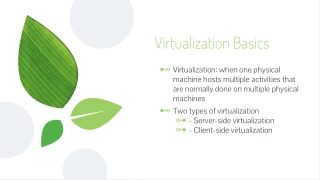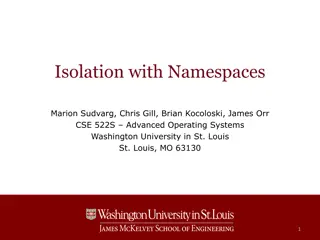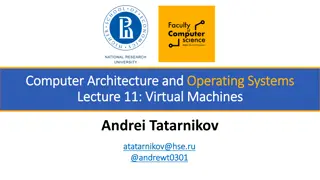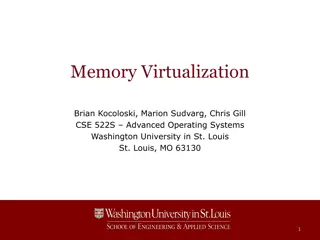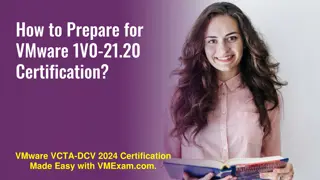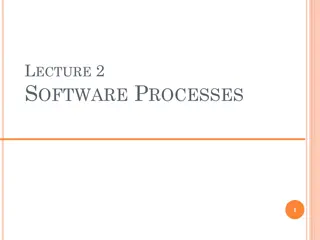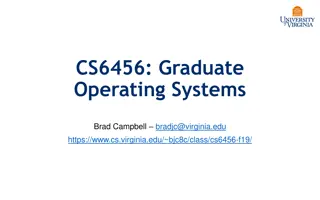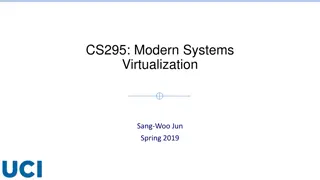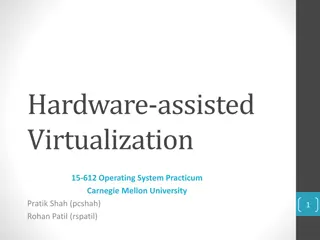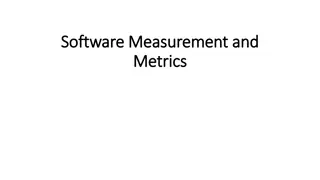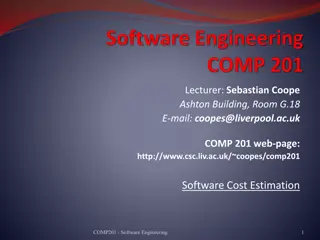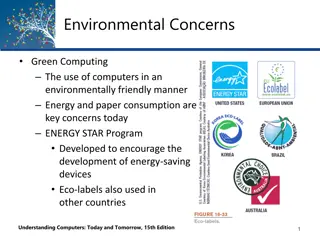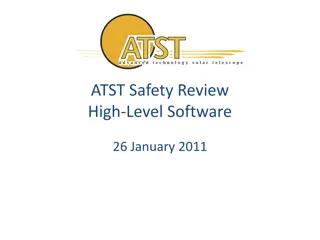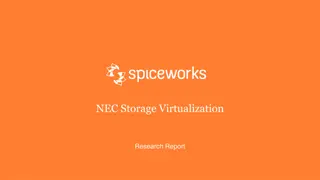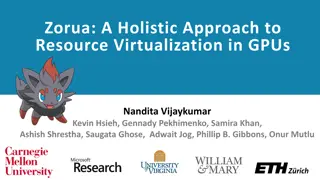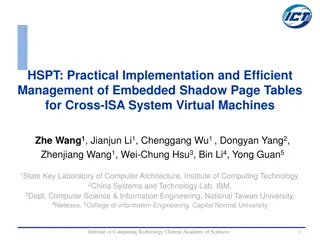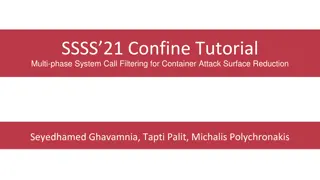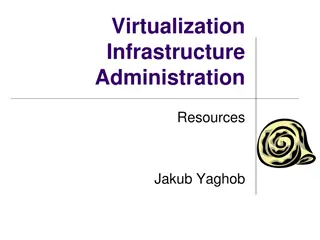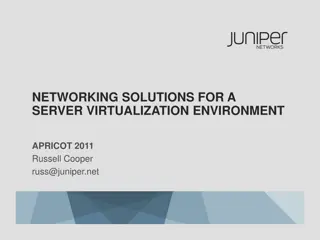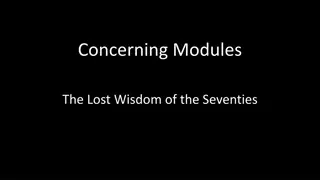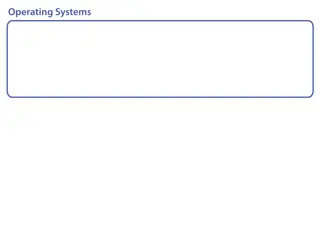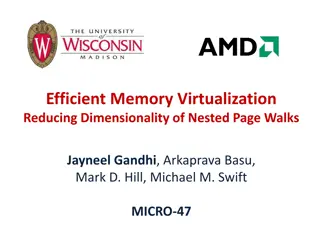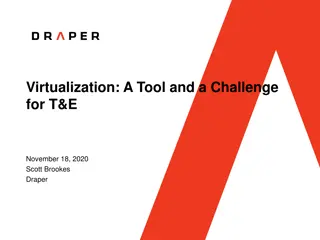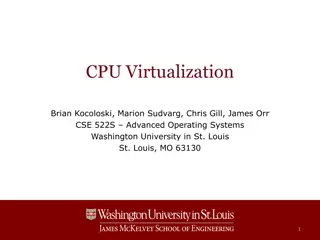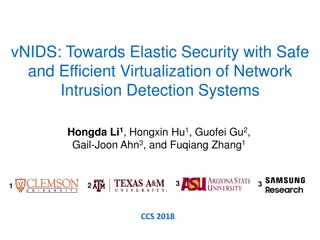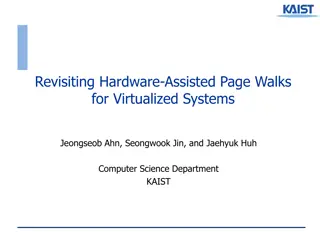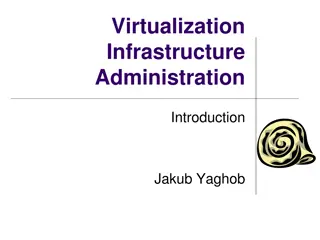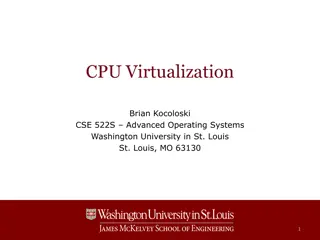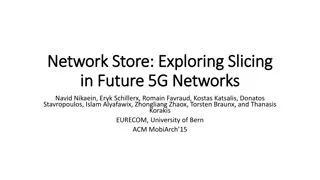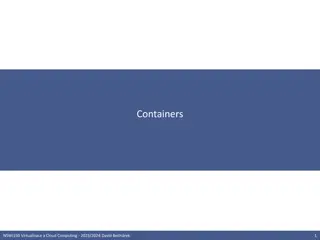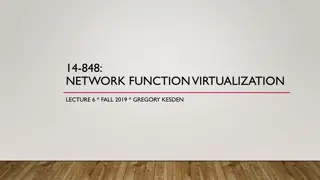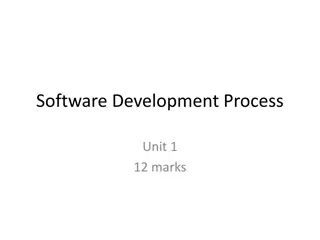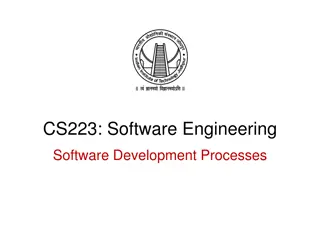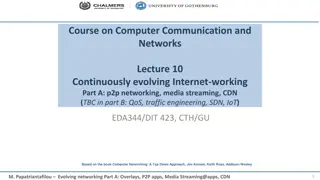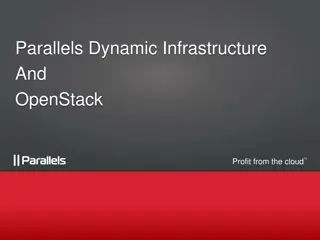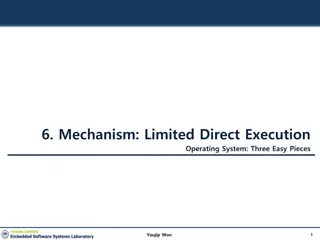Virtualization Basics
Virtualization and its two types: server-side virtualization, which provides virtual desktops for users, and client-side virtualization, which enables virtual environments for applications on personal computers.
0 views • 10 slides
Cloud Computing and Virtualization
Concepts of cloud computing and virtualization, how they enable efficient use of resources, and their advantages and disadvantages. Explore different types of cloud computing services like IaaS, PaaS, SaaS, and DaaS.
2 views • 14 slides
Isolation and Virtualization in Operating Systems
This text delves into the concepts of isolation and virtualization in operating systems. It covers topics such as virtual memory, virtual machines, containers, and kernel isolation mechanisms like chroot and cgroups. The discussion explores how these techniques provide isolation between processes, c
5 views • 20 slides
System Software and BIOS Fundamentals
Explore the different types of system software, learn about the role of computer BIOS and firmware, utilize utility software like Device Manager, delve into virtualization, master the Windows boot sequence, and harness BIOS settings to optimize your computer system. Discover the significance of util
0 views • 16 slides
Exploring Virtual Machines and Operating Systems in Computer Architecture
Discover the history, benefits, and technologies of virtual machines, along with the implementation methods and hardware features supporting virtualization. Learn about different types of hypervisors and applications for virtualization, and delve into current research areas in virtualization technol
0 views • 49 slides
Memory Virtualization in Operating Systems
Memory virtualization in operating systems involves mapping guest addresses to host addresses with an added level of indirection managed by the hypervisor. Virtualization extensions in x86 processors enhance efficiency by allowing safe execution of guest code in Ring 0 through supervisor mode. The a
1 views • 28 slides
1V0-21.20: Associate VMware Data Center Virtualization | Sample Q & A
Click Here---> \/\/bit.ly\/3ShMwk9 <---Get complete detail on 1V0-21.20 exam guide to crack Data Center Virtualization. You can collect all information on 1V0-21.20 tutorial, practice test, books, study material, exam questions, and syllabus. Firm yo
0 views • 17 slides
Software Processes and Models
This lecture discusses software processes, models, and activities involved in requirements engineering, software development, testing, and evolution. It covers topics such as process models, computer-aided software engineering (CASE) technology, software specification, design, validation, and evolut
2 views • 25 slides
Introduction to Virtualization: Concepts and Evolution
Virtualization allows running multiple operating systems on a single physical system, optimizing hardware usage and enhancing flexibility. It can be achieved through different architectures like Hosted and Bare-Metal, with examples including VMware and Xen. The history of virtualization traces back
0 views • 45 slides
Virtualization in Modern Systems
Virtualization plays a crucial role in modern systems by improving portability, security, and efficient resource utilization. Historical uses, examples like IBM VM/370, and benefits in cloud environments are discussed. The working of virtualization, including naive software interpreters and protecte
1 views • 18 slides
Hardware-Assisted Virtualization: VT-x Overview and Implementation
Explore the key concepts of hardware-assisted virtualization using Intel VT-x technology for CPU virtualization, VMX transitions, and VM control structures. Understand the motivation behind VT-x, CPU virtualization techniques, and the benefits of VT-x in simplifying VMM software. Dive into VMX opera
2 views • 28 slides
Software Measurement and Metrics in Software Engineering
Software measurement plays a crucial role in assessing the size, quantity, and quality of software products and processes. It involves direct and indirect measurement methods to monitor and improve software quality, predict future outcomes, and manage project budgets and schedules. Software metrics
0 views • 8 slides
Software Cost Estimation in Software Engineering
Software cost estimation in software engineering involves predicting the resources required for a software development process. It includes fundamental estimation questions, software cost components, costing and pricing considerations, software pricing factors, and programmer productivity assessment
0 views • 30 slides
Green Computing and Virtualization Technologies in Environmental Conservation
Green computing practices, such as the ENERGY STAR program and eco-labels, address energy and paper consumption concerns in an environmentally friendly way. Virtualization technology helps save money spent on energy, hardware, and maintenance while also benefiting the environment. Portable power dev
0 views • 5 slides
ATST Safety Review High-Level Software Overview
This document provides an overview of the high-level software components involved in the ATST Safety Review conducted on 26th January 2011. It includes details on the Telescope Software Control Systems, Observatory Software Control Systems, and Instrument Software Control Systems, along with respons
13 views • 15 slides
Market Trends for Storage Virtualization
NEC conducted research to analyze market trends and needs for storage virtualization, focusing on HYDRAstor advantages over competitors. Key findings include the preference for VMware vSphere, top challenges with current storage solutions, and recommendations to address concerns and highlight benefi
0 views • 24 slides
Zorua: A Holistic Resource Virtualization in GPUs Approach
This paper presents Zorua, a holistic resource virtualization framework for GPUs that aims to reduce the dependence on programmer-specific resource usage, enhance resource efficiency in optimized code, and improve programming ease and performance portability. It addresses key issues such as static a
0 views • 43 slides
Practical Implementation of Embedded Shadow Page Tables for Cross-ISA System Virtual Machines
This research focuses on the practical implementation and efficient management of embedded shadow page tables for cross-ISA system virtual machines. It discusses the framework, evaluation, and conclusions regarding system virtualization, particularly addressing memory virtualization overhead and opt
0 views • 33 slides
SQL Server Polybase: Data Virtualization Overview
Learn about SQL Server Polybase, a data virtualization feature that allows distributed query processing and data virtualization across various sources such as HDFS, Cosmos DB, and more. Discover how to use Polybase to build a data hub within SQL Server, enabling efficient query performance and analy
0 views • 20 slides
Multi-phase System Call Filtering for Container Security Enhancement
This tutorial discusses the importance of multi-phase system call filtering for reducing the attack surface of containers. It covers the benefits of containerization, OS virtualization, and the differences between OS and hardware virtualization. The tutorial emphasizes the need to reduce the kernel
0 views • 32 slides
Memory Management in Operating Systems
Dive into the core concepts of memory management in operating systems, covering address spaces, virtualization, processes and threads, memory multiplexing, binding of instructions and data, and multi-step program processing. Explore the importance of protection, isolation, sharing, and virtualizatio
0 views • 44 slides
Comprehensive Guide to Virtualization Infrastructure Administration
Explore the world of virtualization infrastructure administration, covering resources such as CPU, memory, storage, and network I/O. Learn about resource management, CPU scheduling, memory efficiency, and virtual memory management in virtualized environments. Dive into topics like vCPU mapping, prop
0 views • 10 slides
Networking Solutions for Server Virtualization Challenges
This presentation discusses the challenges server virtualization technologies bring to data center networks. It demonstrates a standards-based approach to enhance the experience and economics in a virtualized environment. Topics include market drivers, limitations of legacy networks, simplification
0 views • 33 slides
Insights from NATO Software Engineering Conferences and The Software Crisis of the Seventies
Exploring the challenges faced in software engineering during the 1970s, including issues such as project delays, inefficiencies, and the critical need for reliable, high-quality software. Insights from the NATO Software Engineering Conferences shed light on the struggle to meet increasing modern so
0 views • 46 slides
Maximizing Your Computer's Performance with Virtualization Software
Enhance your computer's capabilities by utilizing virtualization software like VirtualBox, VMWare, and Parallels to run virtual machines efficiently. Seamlessly operate multiple operating systems on a host OS, boost resource utilization, and achieve smooth file sharing and program installations. Div
0 views • 27 slides
Efficient Memory Virtualization: Reducing Dimensionality of Nested Page Walks
TLB misses in virtual machines can lead to high overheads with hardware-virtualized MMU. This paper proposes segmentation techniques to bypass paging and optimize memory virtualization, achieving near-native performance or better. Overheads of virtualizing memory are analyzed, highlighting the impac
0 views • 48 slides
Virtualization: Hardware Abstraction and Hypervisor Concepts
Dive into the world of virtualization with a focus on hardware abstraction and hypervisor technology. Explore the definitions and examples of hardware virtualization, hypervisors, and hardware abstraction, shedding light on how they enable multiple operating systems to coexist on a single physical m
0 views • 21 slides
Virtualization and System Virtualization in Operating Systems
Virtualization in operating systems plays a crucial role in creating virtual versions of resources like CPU, containers, and virtual machines. It involves techniques like isolating containers and utilizing hypervisors to manage hardware for system virtualization. Hypervisors come in different types,
0 views • 20 slides
Elastic Security Virtualization with vNIDS
Explore the concept of Elastic Security through Safe and Efficient Virtualization of Network Intrusion Detection Systems using vNIDS. This study delves into the challenges of traditional NIDSes, the requirements for virtualized environments, traffic volume variations, new trends in network function
0 views • 36 slides
Hardware-Assisted Page Walks for Virtualized Systems
Virtualization in cloud computing and server consolidation relies on hardware-assisted page walks for address translation in virtualized systems. This involves two-level address translations to ensure isolated address spaces for each virtual machine, utilizing multi-level page tables to manage memor
0 views • 32 slides
Comprehensive Guide to Virtualization Infrastructure Administration by Jakub Yaghob
Dive into the world of virtualization infrastructure administration with a focus on VMware vSphere and Microsoft Hyper-V. Explore courses, resources, feature comparisons, pricing details, and network setup in virtual laboratories. Understand the physical infrastructure applications, operating system
0 views • 14 slides
CPU Virtualization and System Virtualization
Virtualization involves creating virtual versions of systems, such as virtual memory and virtual machines, to optimize resources and support multiple operating systems. Hypervisors are essential for managing hardware and creating isolated environments. Different types of hypervisors exist, with the
0 views • 16 slides
Network Slicing in Future 5G Networks
The research delves into the design of a 5G-ready architecture known as NFV-based Network Store, aiming to serve as a digital distribution platform for 5G applications. By focusing on network slicing and programmability, the architecture enhances resource efficiency and agility in deploying software
0 views • 17 slides
Containers and Virtualization in Cloud Computing
Containers play a crucial role in virtualization by providing isolated environments for processes, addressing issues like dependency conflicts and system configurations. The concept is not new, with Windows NT kernel supporting various types of applications, including legacy Windows and DOS POSIX. M
0 views • 38 slides
Network Function Virtualization (NFV) Overview
Network Function Virtualization (NFV) focuses on virtualizing network functions to improve efficiency and reduce costs in network infrastructure. The lecture discusses key readings, devices that compose a network, specialization of devices, benefits of one-device-does-anything approach, and the goal
0 views • 21 slides
The Essence of Software Development Process
Software is a vital component in today's technology-driven world. It consists of instructions, data structures, and descriptive information that enable the functioning of computer programs. Unlike hardware manufacturing, software development is an engineering process that undergoes changes and deter
0 views • 74 slides
Software Engineering and Development Processes
Explore the key concepts of software engineering, including misconceptions, legacy software, and development phases. Learn about professional responsibilities, the need for software processes, the ETVX model, and different properties of software processes. Discover the components of software process
1 views • 57 slides
Evolving Computer Communication and Networks: P2P Networking, Media Streaming, CDN
Delve into the continuously evolving landscape of computer communication and networks, focusing on P2P networking, media streaming, and CDN technologies. Explore topics such as overlays, P2P applications, multimedia streaming advancements, and the interplay between internet, data processing, and dis
0 views • 63 slides
Enhancing Cloud Profits with Parallels Dynamic Infrastructure and OpenStack
Parallels offers a dynamic infrastructure enabled for over 400 services, including APS, containers, hosted desktops, and automation for cloud profit. Their cloud server and storage solutions optimize virtual environments for high performance and scalability, while their virtualization technologies p
0 views • 13 slides
CPU Virtualization and Execution Control in Operating Systems
Explore the concepts of CPU virtualization, direct execution, and control mechanisms in operating systems illustrated through a series of descriptive images. Learn about efficient CPU virtualization techniques, managing restricted operations, system calls, and a limited direct execution protocol for
0 views • 18 slides
